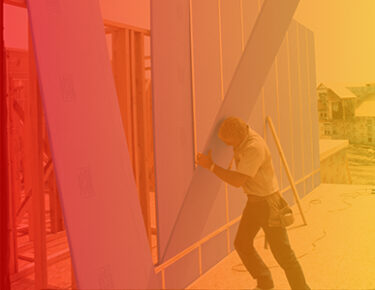 Time-Saving Solutions
Time-Saving Solutions
Make tight construction schedules achievable with PermaBASE
PermaBASE Cement Board can save you precious time over traditional three-coat stucco

The saying, “time is money” couldn’t be more fitting than when applied to the construction industry. Managing ever-changing schedules and a tight labor market makes selecting products of the utmost importance, not only for their quality and performance, but also for their time- and labor-saving features.

Three-coat stucco is a prime example of an installation process filled with opportunities to save on time and labor. This time/cost study by Home Innovation Research Labs™, an independent subsidiary of the National Association of Homebuilders (NAHB), revealed a 35% installation time savings with PermaBASE® Cement Board over the metal lath and scratch installation for adhered stone veneer. The two installation processes are so similar that installers can expect the same time and cost savings with cement board stucco.
This article will show how using PermaBASE Cement Board can take a three-coat stucco process that typically takes three to four days and cut installation time in half for significant cost savings on labor and materials.
What is three-coat stucco and how is it installed?
Stucco exteriors require multiple layers or coats of cement as a foundation for the finished stucco. Over the years, stucco contractors explored methods to cut installation time, including a one-coat technique, but the one-coat method proved to be unreliable because it can easily be damaged.
The three-coat process includes the following installation steps:
- Nail two water-resistant barriers and metal lath to the wall, providing a grid to hold the first layer of cement.
- Apply the scratch coat, so called because installers use a tool to scratch horizontal lines into the ⅜”-thick layer of cement, to give the next layer a solid foundation. Leave the scratch coat to cure for at least 24 hours.
- Apply the brown coat consisting of another ⅜”-thick layer of cement spread evenly to provide a base for the final coat. Leave the brown coat to dry for at least 24 hours.
- Apply the finish coat, also known as the top coat, which can be synthetic or traditional stucco and have a variety of aesthetics from smooth to very textured.
With six trips around the building and each coat taking 24 to 48 hours to cure, it is easy to see how the three-coat stucco process can add days to a project.
How much time does PermaBASE Cement Board save crews?
Installing stucco with PermaBASE Cement Board significantly reduces time-intensive curing. When compared to traditional three-coat stucco, using PermaBASE Cement Board reduces trips around the structure from six to just four. Cement board stucco can also be applied to PermaBASE CI™ Insulated Cement Board.
The cement boards are panels installed similar to drywall. Watch the animated cement board stucco wall system installation video below to see how it’s done.

Cement board stucco includes the following steps:
- Install one weather barrier.
- Hang the PermaBASE Cement Board panels and treat the joints with fiberglass mesh tape.
- Apply a ⅛”-thick stucco base coat, embed fiberglass mesh into the base coat and let it cure for 8 to 24 hours.
- Apply the colored finish coat.
Do weather conditions impact the installation of cement board stucco?
Cement board stucco can be installed in any weather, and the finish coat is the only instance in which temperature is critical. For traditional three-coat stucco, the temperature must be between 40- and 90-degrees Fahrenheit. If it’s too cold, the water won’t cure out of the cement, and if it’s too hot, it dries too fast and starts cracking. In hot weather, stucco crews sometimes have to spray it with water to ensure it doesn’t cure too quickly.
Given the popularity of stucco in dry, arid
regions, such as the Southwest and California, and in humid regions, such as
Florida, cement board stucco is the obvious choice.
Cement board stucco increases job site and installation efficiency.
Use PermaBASE Cement Board on your next stucco project for the following reasons:
- Time and Labor savings – Cement board stucco simply takes less time to install, and traditional stucco crews can easily be trained on how to hang cement board.
- Clean work site – The base coat used with cement board comes premixed, which means no on-site mixing, and the cement board is shipped on a pallet, keeping the work site tidy.
- Material savings: There is very little waste with cement board stucco. On the other hand, applying traditional three-coat stucco can result in a lot of cement ending up as waste on the ground.
Learn more about cement board stucco and how it can save you labor, time and material costs.
Be the first to hear of new NGConnects blog posts by subscribing here for early access.
Related Blog Posts

Why use waterproof cement board
PermaBASE WP Waterproof Cement Board is ideal for interior wet ar...
Read MoreRelated Podcasts

Episode 4: Understanding the ratings behind acoustical wall, ceiling and roof assemblies
Familiarize yourself with STC, IIC, CAC and OITC rating classes a...
Listen Now








